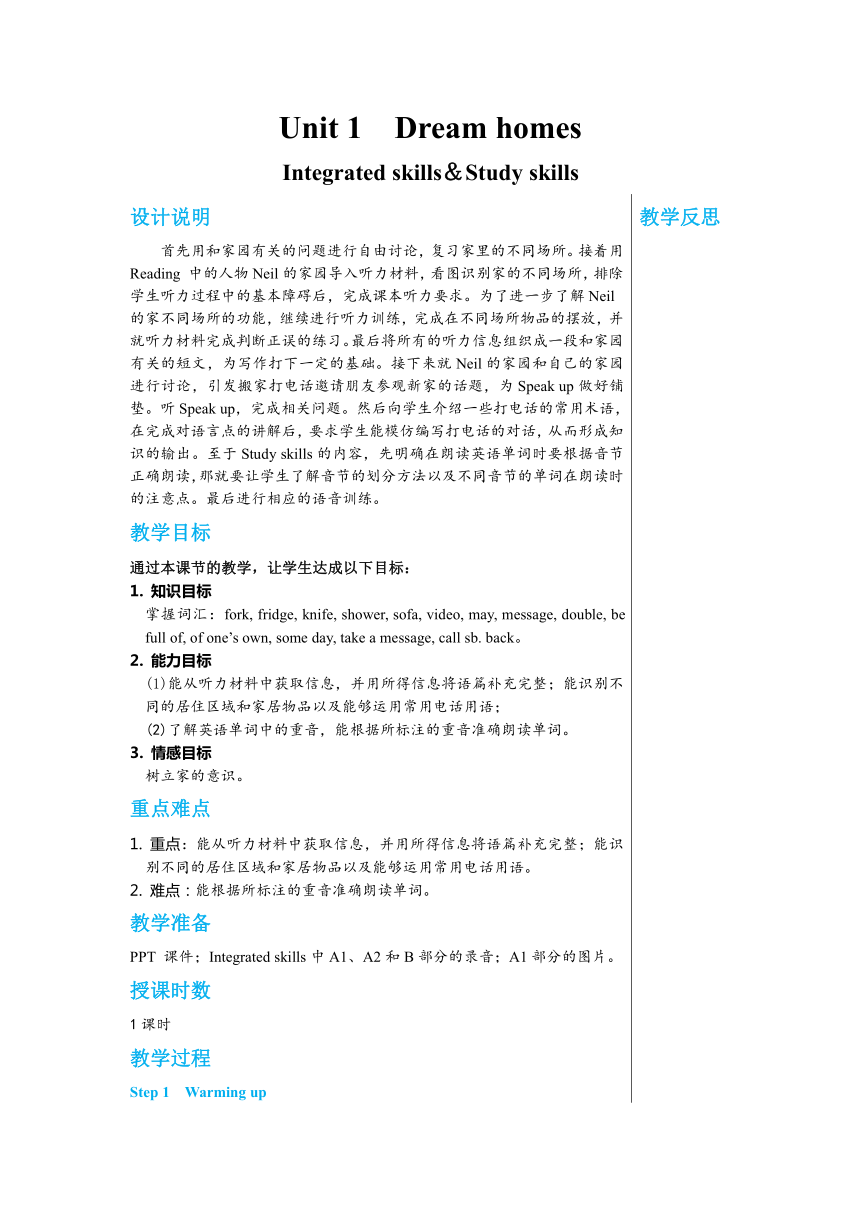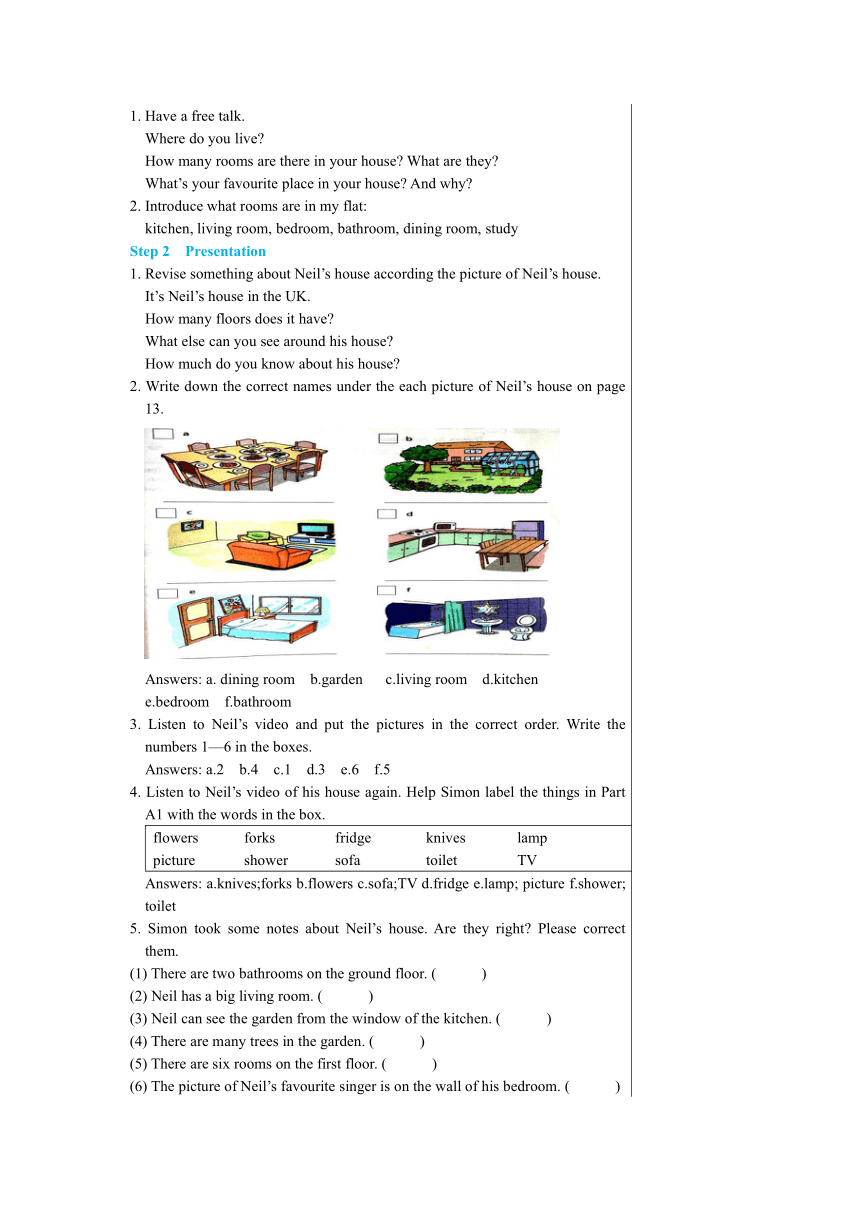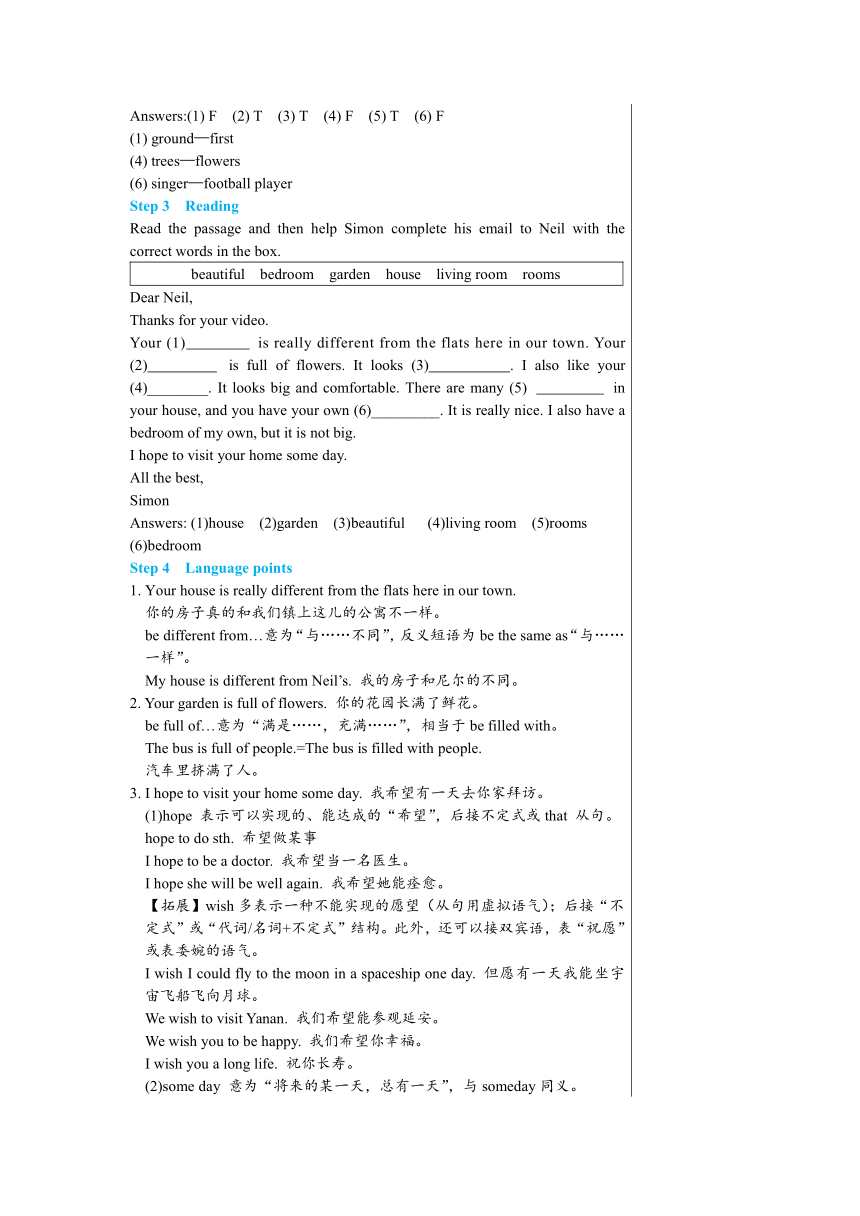Unit 1 Integrated skills & Study skills教学详案-译林牛津版初中英语七年级(下)
文档属性
| 名称 | Unit 1 Integrated skills & Study skills教学详案-译林牛津版初中英语七年级(下) |

|
|
| 格式 | docx | ||
| 文件大小 | 110.0KB | ||
| 资源类型 | 试卷 | ||
| 版本资源 | 牛津译林版 | ||
| 科目 | 英语 | ||
| 更新时间 | 2024-02-21 19:45:06 | ||
图片预览



文档简介
Unit 1 Dream homes
Integrated skills&Study skills
设计说明 首先用和家园有关的问题进行自由讨论,复习家里的不同场所。接着用Reading 中的人物Neil的家园导入听力材料,看图识别家的不同场所,排除学生听力过程中的基本障碍后,完成课本听力要求。为了进一步了解Neil 的家不同场所的功能,继续进行听力训练,完成在不同场所物品的摆放,并就听力材料完成判断正误的练习。最后将所有的听力信息组织成一段和家园有关的短文,为写作打下一定的基础。接下来就Neil的家园和自己的家园进行讨论,引发搬家打电话邀请朋友参观新家的话题,为Speak up做好铺垫。听Speak up,完成相关问题。然后向学生介绍一些打电话的常用术语,在完成对语言点的讲解后,要求学生能模仿编写打电话的对话,从而形成知识的输出。至于Study skills的内容,先明确在朗读英语单词时要根据音节正确朗读,那就要让学生了解音节的划分方法以及不同音节的单词在朗读时的注意点。最后进行相应的语音训练。 教学目标 通过本课节的教学,让学生达成以下目标: 1. 知识目标 掌握词汇:fork, fridge, knife, shower, sofa, video, may, message, double, be full of, of one’s own, some day, take a message, call sb. back。 2. 能力目标 (1)能从听力材料中获取信息,并用所得信息将语篇补充完整;能识别不同的居住区域和家居物品以及能够运用常用电话用语; (2)了解英语单词中的重音,能根据所标注的重音准确朗读单词。 3. 情感目标 树立家的意识。 重点难点 1. 重点:能从听力材料中获取信息,并用所得信息将语篇补充完整;能识别不同的居住区域和家居物品以及能够运用常用电话用语。 2. 难点:能根据所标注的重音准确朗读单词。 教学准备 PPT 课件;Integrated skills中A1、A2和B部分的录音;A1部分的图片。 授课时数 1课时 教学过程 Step 1 Warming up 1. Have a free talk. Where do you live How many rooms are there in your house What are they What’s your favourite place in your house And why 2. Introduce what rooms are in my flat: kitchen, living room, bedroom, bathroom, dining room, study Step 2 Presentation 1. Revise something about Neil’s house according the picture of Neil’s house. It’s Neil’s house in the UK. How many floors does it have What else can you see around his house How much do you know about his house 2. Write down the correct names under the each picture of Neil’s house on page 13. Answers: a. dining room b.garden c.living room d.kitchen e.bedroom f.bathroom 3. Listen to Neil’s video and put the pictures in the correct order. Write the numbers 1—6 in the boxes. Answers: a.2 b.4 c.1 d.3 e.6 f.5 4. Listen to Neil’s video of his house again. Help Simon label the things in Part A1 with the words in the box. flowers forks fridge knives lamp picture shower sofa toilet TV
Answers: a.knives;forks b.flowers c.sofa;TV d.fridge e.lamp; picture f.shower; toilet 5. Simon took some notes about Neil’s house. Are they right Please correct them. (1) There are two bathrooms on the ground floor. ( ) (2) Neil has a big living room. ( ) (3) Neil can see the garden from the window of the kitchen. ( ) (4) There are many trees in the garden. ( ) (5) There are six rooms on the first floor. ( ) (6) The picture of Neil’s favourite singer is on the wall of his bedroom. ( ) Answers:(1) F (2) T (3) T (4) F (5) T (6) F (1) ground—first (4) trees—flowers (6) singer—football player Step 3 Reading Read the passage and then help Simon complete his email to Neil with the correct words in the box. beautiful bedroom garden house living room rooms
Dear Neil, Thanks for your video. Your (1) is really different from the flats here in our town. Your (2) is full of flowers. It looks (3) . I also like your (4)________. It looks big and comfortable. There are many (5) in your house, and you have your own (6)_________. It is really nice. I also have a bedroom of my own, but it is not big. I hope to visit your home some day. All the best, Simon Answers: (1)house (2)garden (3)beautiful (4)living room (5)rooms (6)bedroom Step 4 Language points 1. Your house is really different from the flats here in our town. 你的房子真的和我们镇上这儿的公寓不一样。 be different from…意为“与……不同”,反义短语为be the same as“与……一样”。 My house is different from Neil’s. 我的房子和尼尔的不同。 2. Your garden is full of flowers. 你的花园长满了鲜花。 be full of…意为“满是……,充满……”,相当于be filled with。 The bus is full of people.=The bus is filled with people. 汽车里挤满了人。 3. I hope to visit your home some day. 我希望有一天去你家拜访。 (1)hope 表示可以实现的、能达成的“希望”,后接不定式或that 从句。 hope to do sth. 希望做某事 I hope to be a doctor. 我希望当一名医生。 I hope she will be well again. 我希望她能痊愈。 【拓展】wish多表示一种不能实现的愿望(从句用虚拟语气);后接“不定式”或“代词/名词+不定式”结构。此外,还可以接双宾语,表“祝愿”或表委婉的语气。 I wish I could fly to the moon in a spaceship one day. 但愿有一天我能坐宇宙飞船飞向月球。 We wish to visit Yanan. 我们希望能参观延安。 We wish you to be happy. 我们希望你幸福。 I wish you a long life. 祝你长寿。 (2)some day 意为“将来的某一天,总有一天”,与someday同义。 My dream will come true some day. 总有一天我的梦想会实现。 注意:one day也可表示“某一天”,但它表示不确定时间的“某一天”,既可指过去,也可指将来。 Step 5 Speak up 1. Simon wants to tell Daniel about his new home. He is calling Daniel. Listen to the conversation and answer the questions. (1) Is Daniel at home (2) Where is Simon calling (3) What is Simon’s new telephone number (4) What does Simon ask Daniel’s father to do Answers: (1) No, he’s not at home. (2) He’s calling from his new home. (3) It’s 5557 2188. (4) To ask Daniel to call him back. 2. Read the conversation and pay attention to how to make a call. 3. Ask the students to make a phone call. 4. Present useful telephone expressions. May I speak to..., please Who’s that/speaking, please This is... (speaking). I’m calling from... Can I take a message Can you ask ... to call me back Sorry, wrong number. Can I have your number, please Can you say that again, please Just a minute. Sorry, he’s not here at the moment. Hold on, please. I’ll call back later. Step 6 Language points 1. Can I take a message 我能捎个口信吗? message可数名词,意为“消息,音信”。 常用短语:take a message传话,捎口信 send a message发信息 leave a message留口信 2. Can you ask him to call me back 你能让他给我回个电话吗? ask sb. to do sth . 意为“要求某人做某事”,否定形式是“ask sb. not to do sth.”,意为“要求某人不要做某事”。 Mom often asks me to help her with the dishes. 妈妈经常让我帮她洗碗。 Our teacher asked us not to swim in the river. 老师要求我们不要在河里游泳。 Step 7 Presentation A Practise saying these words. Stressing the first syllable 1. beau·ti·ful 2. coun·try 3. pal·ace Stressing the second syllable 1. ex·pen·sive 2. po·ta·to 3. to·mor·row Stressing the last syllable 1. be·tween 2. en·joy 3. Hal·low·een Stress in a word: When we pronounce words with more than one syllable, we stress one of the syllables. The stressed syllable sounds stronger. The stress can be on the first, middle or last syllable of a word. 划分音节的方法 元音是构成音节的主体,辅音是音节的分界线。 1.两辅音之间不管有多少个元音, 一般都是一个音节。 如: bed 床, bet 打赌, seat 坐位,beat打败, beauty美 2.两元音字母之间有一个辅音字母时, 辅音字母归后一音节。 如: stu’dent 学生, la’bour 劳动 3.有两个辅音字母时,一个辅音字母归前一音节, 一个归后一音节。 如: let’ter 信, win’ter 冬天 4.不能拆分的字母组合按字母组合划分音节。 如: fa’ther 父亲, tea’cher 教师。 B Listen and underline the stressed syllables. 1. cen·tre 2. bath·room 3. hun·dred 4. Oc·to·ber 5. mes·sage 6. in·clude 7. fa·vour·ite 8. won·der·ful 9. de·sign Answers: 1. cen·tre 2. bath·room 3. hun·dred 4. Oc·to·ber 5. mes·sage 6. in·clude 7. fa·vour·ite 8. won·der·ful 9. de·sign Step 8 Homework 1. Remember the new words and the language points in this lesson. 2. Recite the conversation in Integrated skills Part B. 3. Preview Task. 当堂达标 Ⅰ.单项选择 1. —May I speak to John, please — A. Who are you B. What is the matter C. This is John speaking. D. He is John. 2. I hope your hometown some day. A. you will visit B. to visit C. your visit D. you to visit 3.—Thank you for us the useful advice(建议). —You are welcome. A. give B. giving C. gave D. to give 4. The teachers asked us football on the street. A. don’t play B. not play C. not to play D. to not play 5. The old man has his farm. He is the of that cottage (村舍). A. owns; own B. own; an owner C. owner; an own D. own; owner 6. She shares her room a friend of . A. with; her B. to; hers C. with; hers D. from; her 7. If you read a lot, your life will be full pleasure. A. by B. of C. for D. with Ⅱ.根据句意用所给单词的适当形式填空 1. There are two forks and two (knife) on the table. 2. There are many books on those (shelf ). 3. Please let him (call) me back. 4. My English teacher often lets us watch some (video) before class. 5. My cousin wants (have) lunch at school. 6. We like (go) on a picnic at weekends. 7. Peter lives on the (twelve) floor. 8. Our classroom is different from (your). 9. His father hopes he (buy) a new washing machine for his mother. 10. The children are very happy to have (they) own new school. Answers:Ⅰ.1—5 CBBCD 6—7 CB Ⅱ.1. knives 2. shelves 3. call 4. videos 5. to have 6. to go/going 7. twelfth 8. yours 9. will buy 10. their 板书设计 Unit 1 Dream homes Integrated skills & Study skillsfork fridge shower message video be full of of one’s own take a messagebe different from ask sb. to do sth. ask sb. not to do sth. hope to do sth. some day
教学反思
Integrated skills&Study skills
设计说明 首先用和家园有关的问题进行自由讨论,复习家里的不同场所。接着用Reading 中的人物Neil的家园导入听力材料,看图识别家的不同场所,排除学生听力过程中的基本障碍后,完成课本听力要求。为了进一步了解Neil 的家不同场所的功能,继续进行听力训练,完成在不同场所物品的摆放,并就听力材料完成判断正误的练习。最后将所有的听力信息组织成一段和家园有关的短文,为写作打下一定的基础。接下来就Neil的家园和自己的家园进行讨论,引发搬家打电话邀请朋友参观新家的话题,为Speak up做好铺垫。听Speak up,完成相关问题。然后向学生介绍一些打电话的常用术语,在完成对语言点的讲解后,要求学生能模仿编写打电话的对话,从而形成知识的输出。至于Study skills的内容,先明确在朗读英语单词时要根据音节正确朗读,那就要让学生了解音节的划分方法以及不同音节的单词在朗读时的注意点。最后进行相应的语音训练。 教学目标 通过本课节的教学,让学生达成以下目标: 1. 知识目标 掌握词汇:fork, fridge, knife, shower, sofa, video, may, message, double, be full of, of one’s own, some day, take a message, call sb. back。 2. 能力目标 (1)能从听力材料中获取信息,并用所得信息将语篇补充完整;能识别不同的居住区域和家居物品以及能够运用常用电话用语; (2)了解英语单词中的重音,能根据所标注的重音准确朗读单词。 3. 情感目标 树立家的意识。 重点难点 1. 重点:能从听力材料中获取信息,并用所得信息将语篇补充完整;能识别不同的居住区域和家居物品以及能够运用常用电话用语。 2. 难点:能根据所标注的重音准确朗读单词。 教学准备 PPT 课件;Integrated skills中A1、A2和B部分的录音;A1部分的图片。 授课时数 1课时 教学过程 Step 1 Warming up 1. Have a free talk. Where do you live How many rooms are there in your house What are they What’s your favourite place in your house And why 2. Introduce what rooms are in my flat: kitchen, living room, bedroom, bathroom, dining room, study Step 2 Presentation 1. Revise something about Neil’s house according the picture of Neil’s house. It’s Neil’s house in the UK. How many floors does it have What else can you see around his house How much do you know about his house 2. Write down the correct names under the each picture of Neil’s house on page 13. Answers: a. dining room b.garden c.living room d.kitchen e.bedroom f.bathroom 3. Listen to Neil’s video and put the pictures in the correct order. Write the numbers 1—6 in the boxes. Answers: a.2 b.4 c.1 d.3 e.6 f.5 4. Listen to Neil’s video of his house again. Help Simon label the things in Part A1 with the words in the box. flowers forks fridge knives lamp picture shower sofa toilet TV
Answers: a.knives;forks b.flowers c.sofa;TV d.fridge e.lamp; picture f.shower; toilet 5. Simon took some notes about Neil’s house. Are they right Please correct them. (1) There are two bathrooms on the ground floor. ( ) (2) Neil has a big living room. ( ) (3) Neil can see the garden from the window of the kitchen. ( ) (4) There are many trees in the garden. ( ) (5) There are six rooms on the first floor. ( ) (6) The picture of Neil’s favourite singer is on the wall of his bedroom. ( ) Answers:(1) F (2) T (3) T (4) F (5) T (6) F (1) ground—first (4) trees—flowers (6) singer—football player Step 3 Reading Read the passage and then help Simon complete his email to Neil with the correct words in the box. beautiful bedroom garden house living room rooms
Dear Neil, Thanks for your video. Your (1) is really different from the flats here in our town. Your (2) is full of flowers. It looks (3) . I also like your (4)________. It looks big and comfortable. There are many (5) in your house, and you have your own (6)_________. It is really nice. I also have a bedroom of my own, but it is not big. I hope to visit your home some day. All the best, Simon Answers: (1)house (2)garden (3)beautiful (4)living room (5)rooms (6)bedroom Step 4 Language points 1. Your house is really different from the flats here in our town. 你的房子真的和我们镇上这儿的公寓不一样。 be different from…意为“与……不同”,反义短语为be the same as“与……一样”。 My house is different from Neil’s. 我的房子和尼尔的不同。 2. Your garden is full of flowers. 你的花园长满了鲜花。 be full of…意为“满是……,充满……”,相当于be filled with。 The bus is full of people.=The bus is filled with people. 汽车里挤满了人。 3. I hope to visit your home some day. 我希望有一天去你家拜访。 (1)hope 表示可以实现的、能达成的“希望”,后接不定式或that 从句。 hope to do sth. 希望做某事 I hope to be a doctor. 我希望当一名医生。 I hope she will be well again. 我希望她能痊愈。 【拓展】wish多表示一种不能实现的愿望(从句用虚拟语气);后接“不定式”或“代词/名词+不定式”结构。此外,还可以接双宾语,表“祝愿”或表委婉的语气。 I wish I could fly to the moon in a spaceship one day. 但愿有一天我能坐宇宙飞船飞向月球。 We wish to visit Yanan. 我们希望能参观延安。 We wish you to be happy. 我们希望你幸福。 I wish you a long life. 祝你长寿。 (2)some day 意为“将来的某一天,总有一天”,与someday同义。 My dream will come true some day. 总有一天我的梦想会实现。 注意:one day也可表示“某一天”,但它表示不确定时间的“某一天”,既可指过去,也可指将来。 Step 5 Speak up 1. Simon wants to tell Daniel about his new home. He is calling Daniel. Listen to the conversation and answer the questions. (1) Is Daniel at home (2) Where is Simon calling (3) What is Simon’s new telephone number (4) What does Simon ask Daniel’s father to do Answers: (1) No, he’s not at home. (2) He’s calling from his new home. (3) It’s 5557 2188. (4) To ask Daniel to call him back. 2. Read the conversation and pay attention to how to make a call. 3. Ask the students to make a phone call. 4. Present useful telephone expressions. May I speak to..., please Who’s that/speaking, please This is... (speaking). I’m calling from... Can I take a message Can you ask ... to call me back Sorry, wrong number. Can I have your number, please Can you say that again, please Just a minute. Sorry, he’s not here at the moment. Hold on, please. I’ll call back later. Step 6 Language points 1. Can I take a message 我能捎个口信吗? message可数名词,意为“消息,音信”。 常用短语:take a message传话,捎口信 send a message发信息 leave a message留口信 2. Can you ask him to call me back 你能让他给我回个电话吗? ask sb. to do sth . 意为“要求某人做某事”,否定形式是“ask sb. not to do sth.”,意为“要求某人不要做某事”。 Mom often asks me to help her with the dishes. 妈妈经常让我帮她洗碗。 Our teacher asked us not to swim in the river. 老师要求我们不要在河里游泳。 Step 7 Presentation A Practise saying these words. Stressing the first syllable 1. beau·ti·ful 2. coun·try 3. pal·ace Stressing the second syllable 1. ex·pen·sive 2. po·ta·to 3. to·mor·row Stressing the last syllable 1. be·tween 2. en·joy 3. Hal·low·een Stress in a word: When we pronounce words with more than one syllable, we stress one of the syllables. The stressed syllable sounds stronger. The stress can be on the first, middle or last syllable of a word. 划分音节的方法 元音是构成音节的主体,辅音是音节的分界线。 1.两辅音之间不管有多少个元音, 一般都是一个音节。 如: bed 床, bet 打赌, seat 坐位,beat打败, beauty美 2.两元音字母之间有一个辅音字母时, 辅音字母归后一音节。 如: stu’dent 学生, la’bour 劳动 3.有两个辅音字母时,一个辅音字母归前一音节, 一个归后一音节。 如: let’ter 信, win’ter 冬天 4.不能拆分的字母组合按字母组合划分音节。 如: fa’ther 父亲, tea’cher 教师。 B Listen and underline the stressed syllables. 1. cen·tre 2. bath·room 3. hun·dred 4. Oc·to·ber 5. mes·sage 6. in·clude 7. fa·vour·ite 8. won·der·ful 9. de·sign Answers: 1. cen·tre 2. bath·room 3. hun·dred 4. Oc·to·ber 5. mes·sage 6. in·clude 7. fa·vour·ite 8. won·der·ful 9. de·sign Step 8 Homework 1. Remember the new words and the language points in this lesson. 2. Recite the conversation in Integrated skills Part B. 3. Preview Task. 当堂达标 Ⅰ.单项选择 1. —May I speak to John, please — A. Who are you B. What is the matter C. This is John speaking. D. He is John. 2. I hope your hometown some day. A. you will visit B. to visit C. your visit D. you to visit 3.—Thank you for us the useful advice(建议). —You are welcome. A. give B. giving C. gave D. to give 4. The teachers asked us football on the street. A. don’t play B. not play C. not to play D. to not play 5. The old man has his farm. He is the of that cottage (村舍). A. owns; own B. own; an owner C. owner; an own D. own; owner 6. She shares her room a friend of . A. with; her B. to; hers C. with; hers D. from; her 7. If you read a lot, your life will be full pleasure. A. by B. of C. for D. with Ⅱ.根据句意用所给单词的适当形式填空 1. There are two forks and two (knife) on the table. 2. There are many books on those (shelf ). 3. Please let him (call) me back. 4. My English teacher often lets us watch some (video) before class. 5. My cousin wants (have) lunch at school. 6. We like (go) on a picnic at weekends. 7. Peter lives on the (twelve) floor. 8. Our classroom is different from (your). 9. His father hopes he (buy) a new washing machine for his mother. 10. The children are very happy to have (they) own new school. Answers:Ⅰ.1—5 CBBCD 6—7 CB Ⅱ.1. knives 2. shelves 3. call 4. videos 5. to have 6. to go/going 7. twelfth 8. yours 9. will buy 10. their 板书设计 Unit 1 Dream homes Integrated skills & Study skillsfork fridge shower message video be full of of one’s own take a messagebe different from ask sb. to do sth. ask sb. not to do sth. hope to do sth. some day
教学反思
